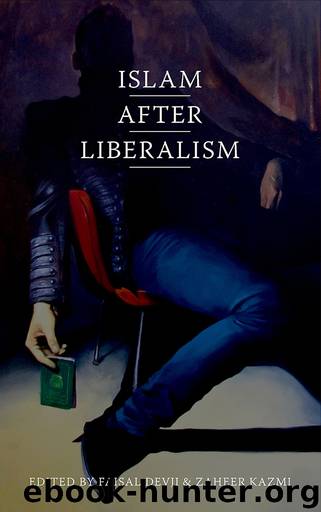Islam After Liberalism by Faisal Devji Zaheer Kazmi

Author:Faisal Devji, Zaheer Kazmi
Language: eng
Format: epub
Publisher: Oxford University Press
Published: 2017-05-03T04:00:00+00:00
Battling Islamic and liberal fundamentalism
Another prominent member of the postra community, Ahmad Baso, underscores the role Islamic post-traditionalism plays as a contrapuntal discourse to the multiple ways in which the term liberal Islam is used. Like Rumadi, he characterises it as an alternative discourse that ‘moves beyond’ (melampaui) not just liberal Islam but also neo-modernism and Wahhabism.32 He too challenges the way in which liberal Islam is interpreted in Kurzman’s Liberal Islam and Barton’s The Idea of Liberal Islam in Indonesia, criticising both not only for their failure to substantially engage with Wahid’s thinking about secularism, the ‘cultural localisation of Islam’ (pribumisasi Islam) and social ethics. Whereas Kurzman does not even mention Wahid, Barton is taken to task for lumping him together with Madjid and for implying that the labels liberal and neo-modernist are identical. According to Baso, Barton’s inability to see that the thought of these two intellectuals developed each in their own specific setting and epistemological framework reflects a theoretical and methodological shortcoming. In comparison with Kurzman and Barton, Binder’s Islamic Liberalism is rated higher, because it is conceived as an open dialogue between Western and Arab-Islamic thinking. This way, liberalism is not just traced back to its Western roots, but conceived as ‘a process of give and take’, in which both Islam and the West give substance to the idea of liberalism by engaging dialectically with questions of modernity, social transformation and local tradition. In his search for the roots of liberal Islam, Kurzman, on the contrary, only looks within Islam itself, ignoring the West as an influential factor in the way liberalism and freethinking in general manifest themselves in the Muslim world and disregarding it as a mitra dialog, or ‘partner in dialogue’, for the emergence of liberal Islamic tendencies.33 Another problem with using only an endogenous Islamic categorisation of liberal is Kurzman’s clustering of very different thinkers, which stand in sharp contrast to the individuals featured in Binder’s Islamic Liberalism, and their critical and dialectical engagement with Western liberal thought, socialism, Marxism and postmodernism.
Baso’s criticism zeroes in on Madjid’s mentor and supervisor during his postgraduate studies in Chicago, Fazlur Rahman, alleging that the two regarded the likes of Ibn Taymiyya and Muhammad ibn Abd al-Wahhab as reformists whose ideas can be interpreted as an indigenous Islamic discourse of liberation—rather than liberalism. Notwithstanding Rahman’s awareness of the shortcomings of Salafi thinking and despite the fact that he also does not go along with their reactionary anti-Western attitudes and fundamentalist tendencies, Baso maintains that the neo-modernism advocated by Rahman is a closed way of thinking not far removed from literalist understandings of the Qur’an and exhibiting a degree of anti-rationalism, while being supportive of reasoning by analogy and partial to orthodox theology. In the political domain, he accuses neo-modernist Muslims of having ‘inherited a mentality that “conflates religion and state” and not foreclosing the possibility of collusion with the military for the sake of obtaining recognition for their reform movement’.34 This leads Baso to the allegation that,
Download
This site does not store any files on its server. We only index and link to content provided by other sites. Please contact the content providers to delete copyright contents if any and email us, we'll remove relevant links or contents immediately.
The History of Jihad: From Muhammad to ISIS by Spencer Robert(2629)
Nine Parts of Desire by Geraldine Brooks(2369)
The Turkish Psychedelic Explosion by Daniel Spicer(2358)
The First Muslim The Story of Muhammad by Lesley Hazleton(2273)
The Essential Rumi by Coleman Barks(2048)
1453 by Roger Crowley(2031)
The Last Mughal by William Dalrymple(1858)
Trickster Travels: A Sixteenth-Century Muslim Between Worlds by Davis Natalie Zemon(1848)
Muhammad: His Life Based on the Earliest Sources by Martin Lings(1649)
God by Aslan Reza(1644)
by Christianity & Islam(1636)
A Concise History of Sunnis and Shi'is by John McHugo(1569)
No God But God by Reza Aslan(1545)
Magic and Divination in Early Islam by Emilie Savage-Smith;(1534)
The Flight of the Intellectuals by Berman Paul(1503)
Nothing to Envy by Barbara Demick(1450)
Art of Betrayal by Gordon Corera(1431)
What the Qur'an Meant by Garry Wills(1395)
Getting Jesus Right: How Muslims Get Jesus and Islam Wrong by James A Beverley & Craig A Evans(1343)
